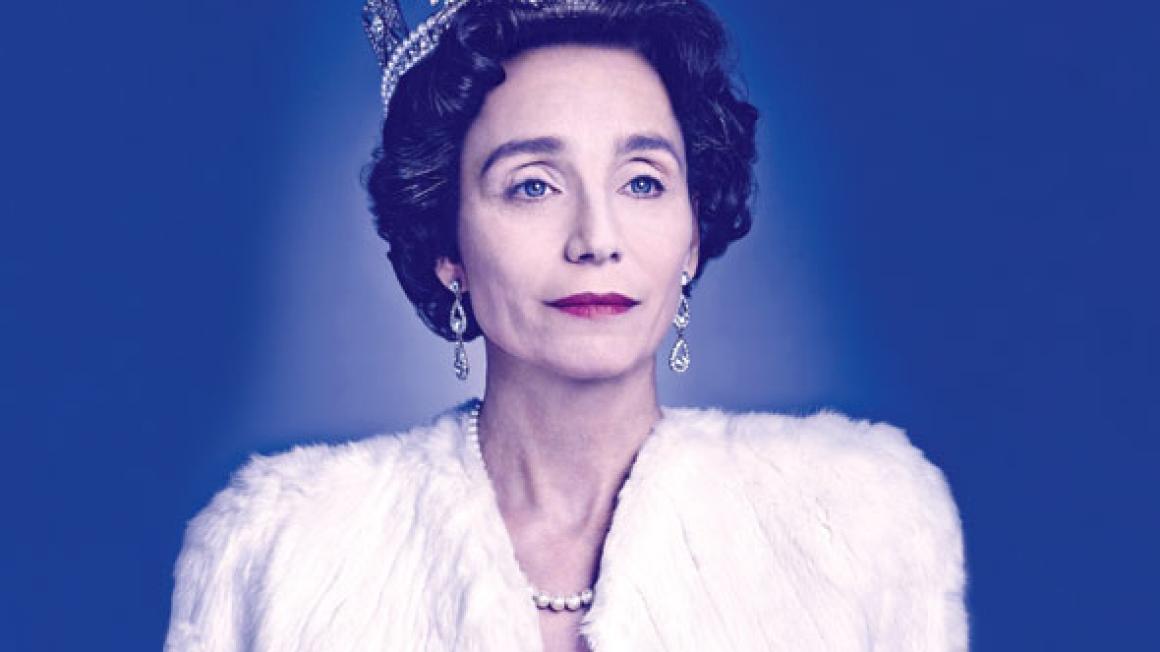ONE is PLAYING the QUEEN
The play, written by Peter Morgan and directed by Stephen Daldry, returns to the London stage on 21 April. Dame Helen Mirren previously played the central role in 2013, for which she won a coveted Olivier Award – and Scott Thomas, who most recently starred in a critically acclaimed production of Sophocles’s Electra and was made a dame in the New Year’s Honours list for Services to Drama, now looks set to do likewise.
‘To see myself wearing the crown and wig suddenly makes it feel all rather real,’ she said.
The Audience imagines the Queen’s weekly meetings with her prime ministers. And during the course of her more than six decades on the throne, Her Majesty has certainly had her fair share of those.
Her first was Winston Churchill, who was serving his second term as PM when Elizabeth II began her reign in February 1952. And her weekly audiences with him must have been quite an event for the young Queen.
After all, Churchill, who served under six monarchs, was rarely fazed. During a wartime stay with Franklin D Roosevelt, for example, he emerged from his bathroom to greet the president, only for his towel to unravel and fall to the floor. Far be it from Churchill to blush, however.
‘The prime minister of Great Britain has nothing to conceal from the president of the United States,’ he reportedly pronounced.
Her Majesty was clearly impressed by Sir Winston Churchill, granting him a state funeral when he died in January 1965. Unusually, she also attended his funeral in person.
The Queen has already had 12 prime ministers serve her – and who wouldn’t wish to be a fly on the wall at her private meetings with them?
Of course, no one knows what really is said. While the monarch has a right and duty to comment on matters of the government, no minutes are taken and it would be the height of vulgarity for a prime minister to spill the beans. It is, however, great fun to imagine.
After all, while the Queen is the very paragon of professionalism, on a personal level she doubtless prefers some of her prime ministers to others. While David Cameron, Baroness Thatcher and Sir John Major received invitations to the wedding of Prince William and Catherine Middleton, for example, Tony Blair (who did give away details of their private conversations in his memoirs) did not.

No doubt there were a lot of strong and very different characters among the Queen’s prime ministers. Harold Wilson, for example, put on a rather affected northern working-class accent, and reportedly convinced the Queen to make their meetings more informal, while John Major was made a special guardian of Princes William and Harry, following the death of Diana, Princess of Wales. The Queen also goes back a long way with David Cameron, who she watched more than three decades ago in a performance of The Wind In The Willows at Heatherdown school, which he starred in alongside Prince Edward.
And then there was Margaret Thatcher, who would often arrive for the weekly audience a quarter of an hour early. Not that this would influence the Queen’s schedule; she’d let the Iron Lady wait precisely 15 minutes. Just like her lady PM, the Queen, it seems, is not for turning.
But what does Scott Thomas think of this menagerie of political heavyweights? ‘I am very much looking forward to meeting my prime ministers,’ she said.
Well, it certainly sounds as if she’s getting into character. Tony Blair, beware.
The Audience is at the Apollo Theatre, Shaftesbury Avenue, London W1 from 21 April: 0844-482 9671, www.theaudienceplay.com/tickets
FROM NANNYING TO DAMEHOOD
Kristin Scott Thomas has long been feted as one of Britain’s most talented actresses and was made a DBE just this month. The eldest daughter of a former drama student and a Royal Navy pilot, she was born in Redruth, Cornwall, in 1960. Her father died in a flying accident when Kristin was five years old, and she was predominantly brought up by her ‘young, exceptionally beautiful mother’.Following schooling at Cheltenham Ladies’ College and then a convent school closer to home, the teenage Kristin moved to Hampstead in London. She worked in a department store before beginning her training at the Central School of Speech and Drama. On being told that she would never be good enough to be an actress, she subsequently moved to Paris to become an au pair.
Defying her critics, she continued to study acting and at the age of 25, was cast in the 1986 film Under The Cherry Moon, directed by the musician Prince.
Kristin’s career continued to gather pace, and she achieved both international fame and acclaim for her turn in 1994’s Four Weddings And A Funeral. She has starred in numerous box-office hits since, including Julian Fellowes’s Gosford Park, Robert Redford’s The Horse Whisperer and in 1996’s The English Patient with Ralph Fiennes. She received an Oscar nomination for her role in the latter.
Having resided in France for most of her adult life, Kristin is a mainstay of both English language and French films (she has appeared in 60). Her role in Philippe Claudel’s I’ve Loved You So Long (2008) earned her both Golden Globe and Bafta nominations.
Now aged 54, Kristin is outspoken about how older women can feel ‘invisible’ both in life and film. She continues to be in demand, however, and will be seen later this year as a Russian empress in The Kitchen Boy. She told The Guardian that she intends to focus on ‘stories about people who have been through life and are still hopeful’.


